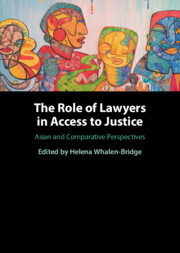Book contents
- The Role of Lawyers in Access to Justice
- The Role of Lawyers in Access to Justice
- Copyright page
- Dedication
- Epigraph
- Contents
- Figures
- Tables
- Appendices
- Contributors
- Foreword
- Acknowledgements
- Abbreviations
- 1 Understanding and Comparing Access to Justice
- Part I Access to Justice in Asia
- Part II Comparative Perspectives on Access to Justice
- 13 Access to Justice and an Islamic Ethic of Justice
- 14 Lawyering in Indonesia’s Religious Courts: Legal Aid, Procedural Justice, and Pragmatism
- 15 Access to Justice and Legal Aid in the Syariah Courts in Malaysia: A Colourful but Threadbare Patchwork System
- 16 The Syariah Court of Singapore: Achieving a More Formal Access to Justice
- 17 Access to Justice in Israel: Rights, Legal Aid, and Pro Bono in a Lawyer Dominant Environment
- 18 Vuk’uzenzele – Arise and Act: Lawyers and Access to Justice in South Africa
- Index
18 - Vuk’uzenzele – Arise and Act: Lawyers and Access to Justice in South Africa
from Part II - Comparative Perspectives on Access to Justice
Published online by Cambridge University Press: 29 September 2022
- The Role of Lawyers in Access to Justice
- The Role of Lawyers in Access to Justice
- Copyright page
- Dedication
- Epigraph
- Contents
- Figures
- Tables
- Appendices
- Contributors
- Foreword
- Acknowledgements
- Abbreviations
- 1 Understanding and Comparing Access to Justice
- Part I Access to Justice in Asia
- Part II Comparative Perspectives on Access to Justice
- 13 Access to Justice and an Islamic Ethic of Justice
- 14 Lawyering in Indonesia’s Religious Courts: Legal Aid, Procedural Justice, and Pragmatism
- 15 Access to Justice and Legal Aid in the Syariah Courts in Malaysia: A Colourful but Threadbare Patchwork System
- 16 The Syariah Court of Singapore: Achieving a More Formal Access to Justice
- 17 Access to Justice in Israel: Rights, Legal Aid, and Pro Bono in a Lawyer Dominant Environment
- 18 Vuk’uzenzele – Arise and Act: Lawyers and Access to Justice in South Africa
- Index
Summary
South Africa’s context is one that has to deal with apartheid and its devastating legacies. The chapter traces the evolution of pro bono and related practices in this context, from a professional ‘duty’ or ‘calling’ to one founded in the South African Constitution. The chapter argues that it is this constitutional foundation that has led to the institutionalization of ‘community service’ as a mandatory feature of being a South African legal professional. The chapter then considers the contemplated community service regime and other recent legislative changes to the South African access to justice landscape. The drafters of the legislation clearly see the community service regime as a chance for improved access to justice for vulnerable persons. However, having erased enforcement mechanisms for pro bono in the process, and with no implementation of community service in sight, South Africa’s new legislative scheme may not have its intended effect. The chapter argues that a complementary, multipronged approach is needed. This approach includes the provision of community service alongside state legal aid and pro bono, together with the caps on legal fees currently being considered by the government – all ideas worth serious consideration in a country where there is considerable unmet legal need.
- Type
- Chapter
- Information
- The Role of Lawyers in Access to JusticeAsian and Comparative Perspectives, pp. 327 - 344Publisher: Cambridge University PressPrint publication year: 2022



